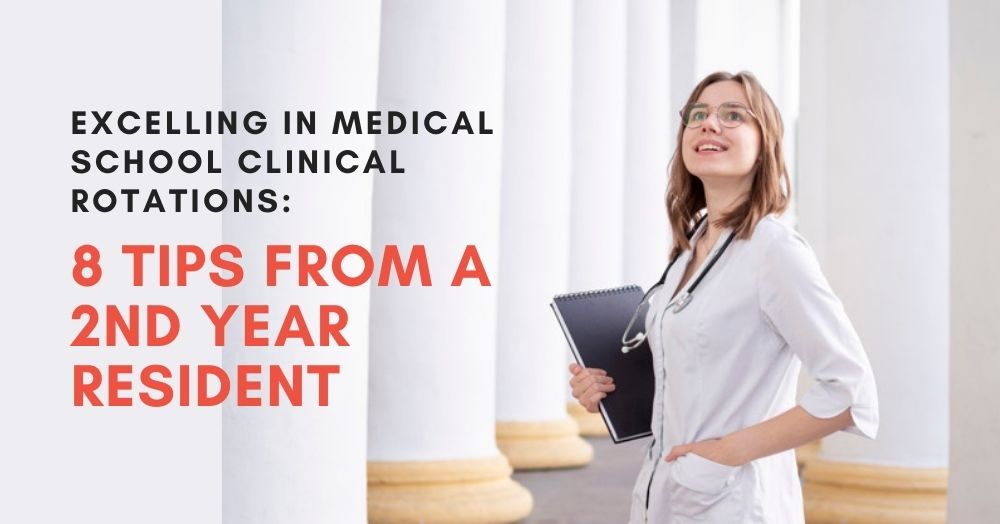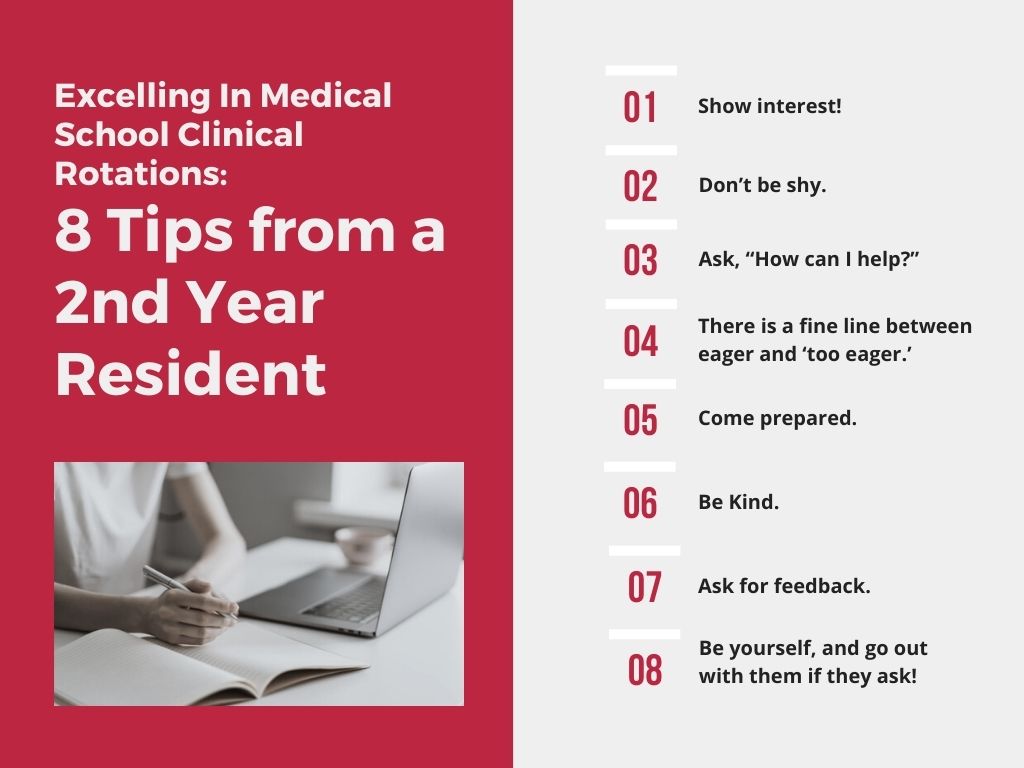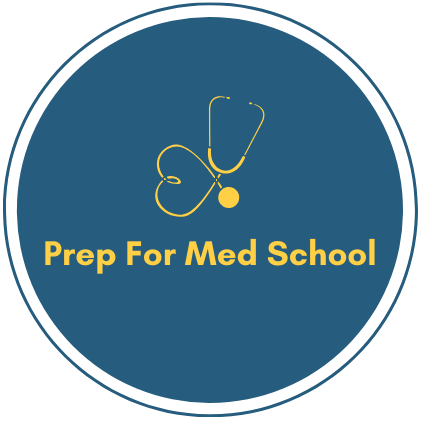Excelling In Medical School Clinical Rotations: 8 Tips from a 2nd Year Resident

As Step 1 has been demoted to a pass/fail exam, your 3rd/4th-year rotation evaluations (MSPE) have gained traction as a leading factor in how you perform in the match. Most rotations last one month, and depending on the specialty, there’s a possibility that you may only get that one month to make a lasting impression.
In the emergency medicine field, residents work closely with medical students. Being a part of the match process has given me a glimpse of what sets apart the desired applicant from one that is not. Having had enough time evaluating students on their ER rotations, these are some general tips that I feel are generally helpful if you want to do well during medical school clinical rotations.
But before delving into the specific tips, let’s take a look at what a medical student evaluation looks like.
What a Medical Student Performance Evaluation (MSPE) Looks Like
If you want to see what an evaluator looks for, here is a glimpse of what a medical student evaluation looks like.
From a scale of 1-10:
– Fund of knowledge for patient care
– History taking and interview skills
– Physical exam and assessment
– Formulation of diagnosis and treatment plans
- Pro tip: This is by far the hardest skill! Always provide a couple of differentials in your presentation, and take a gander at what you would do for the management of the patient. Even if you’re wrong, attendings/residents will be impressed you gave it a go.
– Written Communication
– Verbal Communication
– Communication with Patients and Families
– Procedural Skills
– Individual Awareness and Response to Feedback
Other portions of the medical student evaluation include a blank space for comments and questions about professionalism. This portion holds the greatest weight in the evaluation.
Professionalism includes actions that include tardiness, requests to leave early, etc. Just. Don’t. Do it. If this is the specialty you have had your eye on. All your hard work goes out the window because it will be overshadowed by your lack of professionalism.
The Tips for Doing Well During Rotations

So now that we know what evaluators look for, let’s take a look at the tips for doing well during your rotations.
1. Show interest!
There’s nothing worse than the medical student that wants to leave…ASAP. A resident is balancing a lot on their plate – and as much as you offer help in running errands for them, they also take time out of their schedules to teach you. Even if you are not considering the specialty, this may be the only time you are exposed to this specialty ever again. Cherish it!
Not only that, resident and attending evaluations for hospital rotations are often included in your MSPE (Medical Student Performance Evaluation). Be curious and work hard. It’s the best recipe for some glowing comments on your evaluations.
2. Don’t be shy.
It’s daunting jumping into a new rotation – but no one’s going to know your name if you don’t introduce yourself. Make it a habit to introduce yourself to the residents and the attendings. Brownie points for offering help to the nurses and technicians as well. They can teach you invaluable skills that can only be learned by hands-on training, such as putting in IV lines or properly placing EKG leads.
3. Ask, “How can I help?”
Be proactive. Sometimes residents get overwhelmed (remember, they’re learning on the spot too!), so offer some help from time to time. This is also a time where your knowledge can come into play.
For example, if a patient is in the process of getting intubated – get an orogastric tube or a Foley catheter ready. Not only does this demonstrate your understanding of medicine, but it also shows that you are paying attention and trying to help in every way possible.
4. There is a fine line between eager and ‘too eager.’
Most of the time, you are not alone in these rotations. Medical school peers, outside rotators, and mid-level students are often on your team as well. Here are things to consider as you go through your rotations:
– If you had the chance to carry out a procedure – give your peers the chance to do so, too: Teamwork is just as important as proficiency. Take a step back if another student hasn’t had the chance to try something out. Some procedures are hard to come by, so understand that in the limited time you have on the rotation, there may not be many opportunities to go around.
– Stay in your lane! If an attending physician or resident is asking a specific student a question, be respectful of your peers. Don’t impatiently raise your hand, present body language that you know the answer, etc. It’s nerve-wracking for the student on the spot, so allow them time to answer the question. If the individual asking the question opens it up to the rest of the team, it’s fair game.
5. Come prepared.
For rotations that are not within your home institution system, there will be a lot of credentialing paperwork. Do your homework early and see what you’ll need – many are time-intensive, such as acquiring your recent titers, or getting a physical exam from your primary care physician.
Shooting an email early or giving a call to the medical school coordinator is an excellent way to get ahead of the game. Time is of the essence in your 3rd/4th years – getting behind may be the difference between matching and not.
6. Be Kind.
You would think this would be common sense! As we’ve harped on a number of times before – attendings and residents are mainly responsible for evaluations, but word travels. Bossing around nurses or other staff while you are on rotation is a big faux pas. Remember, that you’re a guest, and you are there to learn.
Treat EVERYONE with respect, and realize they have been there way longer than you have.
7. Ask for feedback.
The best medical students are those that are willing to learn from their mistakes. Ask for verbal feedback after each shift!
Many rotations will provide residents online evaluations to fill-out – but these evaluations are often not privy to your knowledge. It also shows a desire to improve, which is a huge strength in a potential resident.
8. Be yourself, and go out with them if they ask!
In the end, if you’re interested in a particular specialty/institution – the residency just wants to know that you will be easy to work with. What does that mean? Go out with them and show them you can hold a conversation, and that you have a life outside of work. You’ll potentially be spending multiple years working alongside them.
As much as it is important to know the medicine and be procedurally adept – all of this can be taught – it will just take time. The most important thing is whether you fit within the culture of the residency.
***
The tips above should cover most of what evaluators look for in medical students. Best of luck on your rotations! Comment below on other things you would like to hear more about.

Leave a Reply